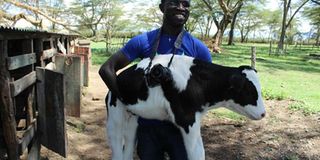Young man’s online forum makes buying cows simple

Calves must be fed on colostrum during their early weeks before being introduced to forages. File | Nation. PHOTO | MACHARIA MWANGI |
What you need to know:
- The many reasons why you should venture into farming.
Victor Otieno was the first runner-up in the Israeli-Kenya agri-challenge last week for his revolutionary Cowsoko.com, an online shop for dairy farmers. BILLY MUIRURI tracked down the 27-year-old to unwrap his new calling.
What do you do for a living?
I run an online platform where farmers can buy or sell high-producing dairy cows. Those selling post pictures of the cows and their prices to www.cowsoko.com. Buyers access the information and can choose from several options available. Accessing the site is free but sellers pay a membership fee online.
What prepares you for this business?
I hold a diploma in Dairy Technology and a degree in Animal Science from Egerton University. I am also certified by the Cowsignal Training from the Netherlands as a cow signal master
So what exactly happens in Cowsoko.com?
Here, dairy cows, feeds, drugs and all other livestock inputs and services are listed for private sale. Dairy experts sell their services and farmers interact and post ideas and questions in the forum section.
We realised once farmers buy cows, they needed to know different options of feeds, drugs and fodder available near them and the prices of each in order to make informed decisions.
Dairy societies buy products at exaggerated costs simply because they don’t know there are options. So we decided to add a platform where companies that offer similar products can list their products online.
Farmers can then filter the information and directly contact the suppliers.
What motivated you to walk this path?
I once visited a farmer in Kiambu who had sold her grade cow for Sh70,000 and she thought she had made a killing. But as she escorted me to the bus stage, we met her neighbour who had bought the same cow for Sh130,000.
If only she could sell directly to her neighbour, she wouldn’t have lost Sh60,000.
A manager of a dairy cooperative in Meru had only one brand of dairy meal because that’s the only supplier he knew. I realised there was a gap in information about dairy farming.
I decided to get a site to organise information and give farmers options.
How many cows are you able to help sell or buy in a good month and what is the range of the prices?
We are only a few months old. Every cow posted is always sold by the third day. In fact, we have more people looking for cows online than people selling.
I have a list of people who need around 50 cows that I have not been able to source. The most expensive cow sold on our platform was Sh250,000.
I was surprised it was sold on the day it was posted. Sometimes we have people selling bullocks for as low as Sh10,000.
Our earnings are determined by the membership and the length of time your product stays on our site.
What are some of the main challenges of starting a dairy enterprise in Kenya?
We lack a central market place for high cow breeds. There are also few financing options. A pedigree cow can go for between Sh200,000 and Sh300,000, yet few financial institutions have a purely dairy package.
At Cowsoko, we are piloting a model where we will support farmers to identify a good cow, then banks offer them financing and recover their costs from the supply of milk to processors.
But even more challenging is getting a credible farm worker or manager with the know-how and commitment to handle a grade cow. Then the country is awash with fake feeds.
At Cowsoko, we connect farmers to model farms where they learn about fodder preparation.
What would you say about the wide berth that young people are giving agriculture?
I disagree with the approach taken to entice youth into agriculture. Starting a farming business is expensive and complicated. Start-ups also have limited financing options. Yet engaging in agriculture doesn’t have to start at that primary level. Youths can explore the value chains.
Most farms where we want the youth to be involved in rarely make profits and we may need innovation from young people to turn them around.




